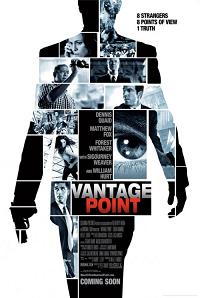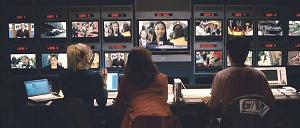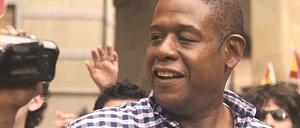Movie Review: Vantage Point
 | | Vantage Point |
The president has just been shot. A huge crowd is dispersing in panic. Somewhere in the distance, an explosion rocks the city. The secret service try to make sense out of the situation as a local cop shows up to protect the city’s mayor, a man with a digital camera and a really good eye gets the most important beats on tape, a building is searched for the sniper, the president is rushed away, and a news team sits in awe, trying to figure out what to do next. Then, before the chaos can even settle, the stage explodes in a rocking fireball.
This is the general set-up for this year’s overlooked popcorn flick, Vantage Point, a film that tries to be part Hitchcock gimmick and part 24. For most of the movie, we are treated to various points of view, one at a time, over the same brief series of events, encouraged to gather the clues and figure out the details of the story on our own. As the movie progresses, however, the gimmick falters as it attempts to take the story outside of the initial event and into things that happen immediately afterwards, suddenly and awkwardly reintroducing multiple points of view somewhere after the half-way point. Additionally, the sense of mystery fades as the slightly amateurish director (big screen newcomer Pete Travis) insists on showing and explaining every little detail ad nauseum, leaving virtually nothing to the viewer’s imagination or deduction in the end.
 | | This is a movie that lives up to its name |
Still, the heightened action and drama, including a pretty good car chase, make up for the apparent loss in narrative concept during the final act of the film. And the expertise with which multiple and complex events are entwined should not be downplayed. From the first run-through—which takes the appropriate point of view of Rex Brooks (played by a still hot and always talented Sigourney Weaver), the producer of the newscast covering the event—we get the sense that this story would be impossible to tell from a single point of view and would lose its punch if it tried. It would even be remarkably difficult to tell this story in a more traditional, consecutive order, so the nature of the story does a good job justifying the film’s gimmicky nature (something even 24 has trouble with from time to time).
 | | Forest Whitaker's character is probably my favorite |
The writing is also remarkably clever in how it doles out information. For example, during the scenes with Rex Brooks, she notices that one of the secret service agents guarding the president is none other than Thomas Barnes (played by a pensive Dennis Quaid), a hero who took a bullet for the president (William Hurt, who actually acted like he was just picking up a paycheck) the year before. In a rush to exploit this turn of events, the news crew pulls up footage of Barnes from the archive and the audience is given everything it needs to know about Barnes with a two second film clip and one or two succinct lines of dialogue. Naturally, we see the story from Barnes’ point of view later in the film, and it helps that we know his history before he is even formally introduced. This is a single example of how tight the script is from beginning to end, and that helps me forgive the final act’s discarding of the formula it strives so hard to justify.
 | | Prepare to recognize a whole slew of actors and actresses |
The story also has its fair share of twists, all of which work. While the biggest twist is fairly easy to see coming, the twist that would have been the best was completely spoiled by the film’s promotional department. I won’t spoil it here, in the hopes that you haven’t had it spoiled already, but it’s a twist you likely wouldn’t see coming had it not been shown in the previews, and it happens late enough in the film that it dramatically changes your vantage point—so to speak—on what’s going on. It’s a separate issue and one that doesn’t reflect on the overall quality of the film, but I have to boldly pronounce a pet peeve: movie previews should not reveal major plot twists!
As for the movie itself, it’s surprisingly well-made. The action is well-choreographed, the ensemble acting is excellent, and the special effects are top notch.
 | | The best special effects are the ones you never notice |
When I talk about the special effects, I’m not just referring to the explosions—of which there are many—but also the more hidden effects. An example from early in the film is when Howard Lewis, a vacationing American with a camera (played by the amazing Forest Whitaker), uses his camera to zoom in on the window where the sniper shot came from. With Barnes looking on, we see the camera’s display screen showing the window beyond it, and the movie camera is handheld, so every jitter of Lewis’ camera screen has to be matched to the jitter of the movie’s camera. It’s done flawlessly, and most people won’t even realize how technically difficult that shot is to achieve.
But let’s face it, this movie was not made to win Oscars or woo critics; it was made for action movie fans. And in that capacity, it delivers. Vantage Point may not be a perfect film, but it is much better than it probably should be. It will keep its audience on the edge of its seat for an electrifying ninety minutes of good fun, and that’s why I love it.
-e. magill, 07/14/2008
|
|